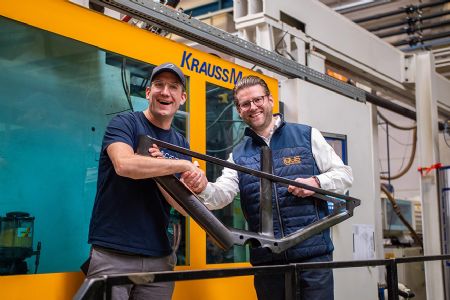 The new bicycle frame weighs 3.3kg, is recyclable and injection moulded as a single piece. Photo: igus
The new bicycle frame weighs 3.3kg, is recyclable and injection moulded as a single piece. Photo: igusFirst,
igus launched the RCYL Bike, a bicycle made from recycled fishing nets. Now the company is setting the next milestone for sustainable mobility: a company first, it has developed an injection-moulded bicycle frame made of recyclable composite material for the e-bike manufacturer
Advanced Bikes. Knowledge acquired over decades in plastics processing and the experience gained with the RCYL bike helped develop both the frame and new components made of high-performance plastics.
It is predicted that in 2024, e-bikes will be the most popular type of bicycle purchased in the UK. This trend is partly driven by environmental concerns, as 90% of today’s bicycle frames are made of aluminium or carbon, produced in energy-intensive processes and ending up in huge bicycle landfills at the end of their life.
To help drive the transformation to a circular economy, e-bike manufacturer Advanced Bikes is relying on igus for their future frame production. The companies have worked together to develop a sustainable, composite material bicycle frame for use in the new
Reco Urban trekking e-bike.
Matthew Aldridge, managing director at igus UK, said: “The aim of Advanced Bikes was to produce a frame from a composite material with 100% recyclable plastic using injection moulding. Since we have been developing components such as plain bearings, rod ends, and gears for the bicycle industry for over 30 years, we immediately took on the challenge of supporting the company in the bicycle frame design and taking over development, tooling and injection moulding.”
Complex geometryTo ensure that the frame has sufficient strength, stiffness and low weight, igus uses a composite material in granulate form, consisting of high-performance plastics and carbon fibres. It also designed and made a multi-part injection moulding tool for the complex geometry of the bicycle frame within a few weeks. The result — a 3.3kg lightweight bicycle frame injected moulded in a single part — no welds, corrosion-resistant, durable and tested. igus is also able to regranulate end-of-life frames via its own ‘chainge’ recycling programme, recycling the material.
Helge von Fugler, founder and managing director of Advanced Bikes, said: “In the future, we want to have other recyclable bicycle components such as luggage racks, rims, spokes and seat posts, all manufactured using injection moulding. This is the only way to make a completely recyclable e-bike a reality.”
 Pictured Helge von Fugler (left), founder and managing director of Advanced Bikes, with Jan Philipp Hollmann, head of bike components at igus
Pictured Helge von Fugler (left), founder and managing director of Advanced Bikes, with Jan Philipp Hollmann, head of bike components at igusigus currently produces bicycle frames using two different processes in injection moulding, both components and frames are produced in one piece. Frames are also manufactured using rotational moulding, such as for the RCYL bike. But it is not just about bicycle frames. igus has extensive knowledge in plastics processing and this product development experience is now being used for new bicycle components — from wheels to cranks, from handlebars to planetary gears.
lubrication and corrosion-freeLarge- and small-volume production can therefore be carried out cost-effectively. In addition, these high-performance plastic components are lighter, lubrication and corrosion-free. Users can reach for the high-pressure cleaner because no lubricant is washed out and nothing can rust.
igus tests all components extensively before use. 135 trillion test cycles and 15,000 trials take place every year in their test laboratory, 250m
2 of which are used to test bicycle components, including the new Reco frame. Mr Aldridge, added: “We will test the first injection-moulded bike frames with computed tomography for problems such as air pockets in the composite material and carry out all relevant frame tests in our laboratory.”
Customers receive a 30-year warranty from Advanced Bikes and for maximum safety, igus uses a variety of test methods. Mr Aldridge continued: “These are based on standard tests, for example by the EFBE (specialist bicycle standards agency) and the TÜV.”
igus also conducts its own test procedures, including the use of a climate chamber, the data from which can be used to make precise statements about the service life of igus materials under different environmental conditions.
“With bicycle components made of high-performance plastic, we offer the bicycle industry access to a completely new technology. In this way, we also offer solutions to OEM manufacturers who want to implement their own ideas and designs with us.”
By using plastic, developers can completely rethink bike design and geometry; and at igus, they receive everything from a single source — from design to research and development, toolmaking, compounding, testing and production to recycling. Just-in-time production means that igus can deliver quickly, and stock capacities at the customer’s premises can be reduced. The business is more predictable and profitable due to ‘make to order’.